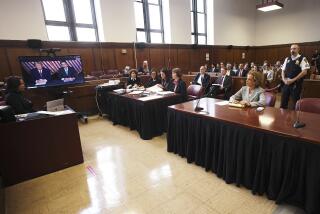Trump targets key Dodd-Frank financial regulations and taxes in new executive actions

Trump is turning his attention to financial reform again as a top House Republican this week unveiled the latest version of legislation to replace Dodd-Frank, which was enacted in the wake of the financial crisis. (Sign up for our free video newslet
President Trump, who has vowed to dismantle the landmark Dodd-Frank financial reform law, will take aim at two of its pillars on Friday.
During an appearance at the Treasury Department, Trump is scheduled to sign two presidential memos ordering six-month reviews of the 2010 law’s authority for regulators to designate large firms as a risk to the financial system and to try to shut them down with minimal collateral damage if they’re on the verge of failing, the White House said.
Trump also will sign an executive order directing Treasury Secretary Steven T. Mnuchin to review significant changes to the tax code made last year to determine if they “impose an undue financial burden on American taxpayers,” “add undue complexity” or “exceed statutory authority,” the White House said.
That order could be aimed at rules enacted by the Obama administration to crack down on so-called inversions in which companies shift their headquarters abroad to reduce their U.S. tax bills.
Like other Trump executive actions, these moves simply direct Cabinet-level reviews and don’t make any substantive changes in federal policy. In the case of Dodd-Frank, Trump already ordered the Treasury Department in early February to consult with regulators on a review of the entire law and report back in four months.
Trump is turning his attention to financial reform again as a top House Republican this week unveiled the latest version of legislation to replace Dodd-Frank, which was enacted in the wake of the financial crisis.
The legislation toughened bank regulations, sought to avoid future bailouts by creating a process to shut down teetering financial giants, established a powerful panel of regulators to watch for signs of instability and created the Consumer Financial Protection Bureau to oversee credit cards, mortgages and other financial products.
One of former President Obama’s signature accomplishments, Dodd-Frank was enacted with almost no Republican support. GOP lawmakers have criticized it as too heavy-handed and have sought major changes.
On Friday, Trump is scheduled to make the short walk from the White House to the Treasury Department to sign executive memos targeting two specific provisions about which Republicans have complained.
The first directs Mnuchin to review the law’s orderly-liquidation authority and determine whether making changes to bankruptcy law “would be a superior alternative to resolve failing financial companies.”
A key trigger to the 2008 financial crisis was the bankruptcy filing of Wall Street investment bank Lehman Bros. in September of that year, which threw financial markets into chaos.
Under the liquidation authority, regulators would safely shut down a major financial firm in the same way the Federal Deposit Insurance Corp. winds down failing banks.
Republicans have complained the process could be similar to a bailout. Trump’s order directs Mnuchin to determine if the authority could lead to costs for the Treasury, and hence to taxpayers.
The second memo focuses on the Financial Stability Oversight Council, a panel of top regulators created by Dodd-Frank.
The council has the authority to designate some non-banks as systemically important financial institutions, which face tougher oversight. Banks with more than $50 billion in assets are automatically designated as systemically important.
The memo directs Mnuchin to assess the council’s designation process and “the risks created by such designations.”
Some lawmakers have wanted the $50-billion level raised so only the biggest banks receive the designation, and have complained that the designation process for non-banks is flawed.
Insurance company MetLife Inc. was designated systemically important in 2014 and sued to have the tag rescinded. A federal judge sided with MetLife last year but the Obama administration appealed the case.
Twitter: @JimPuzzanghera
More to Read
Start your day right
Sign up for Essential California for news, features and recommendations from the L.A. Times and beyond in your inbox six days a week.
You may occasionally receive promotional content from the Los Angeles Times.







